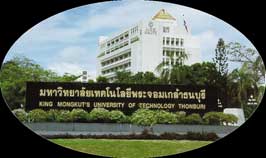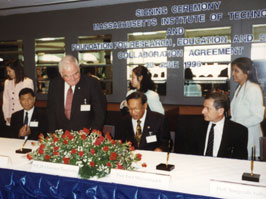“We were the first to launch the ChEPS program. It opened up a new world to engineering postgraduates who were familiar with learning from the comforts of a classroom and by memorizing textbooks, listening to lectures, writing reports, sitting for exams, and researching in labs. But knowledge taught in a classroom environment is effective only up to a certain level. We can now bridge that gap between theory and practice to complete the training process with the support we are receiving from the industrial sector for the ChEPS program.”
Dr. Krissanapong Kirtikara,
Dean, KMUTT.
Thailand
A CONDUIT FOR LEARNING

TDP has been assisting in two projects in Thailand, with both King Mongkut University of Technology (KMUTT) and the National Science Technology & Development Agency (NSTDA). While the NSTDA project is currently inactive, the KMUTT project continues: a good example of both the cross platform knowledge sharing central to TDP's philosophy, and its practical application for real-world learning and advancement.
In our work with KMUTT, TDP has been aiding in the development of the atmosphere of cooperation with academia, industry, and local Thai government crucial to the science and technology infrastructure a graduate-level research university can provide.
Over 11 years ago, MIT helped KMUTT establish the Chemical Engineering Practice School concept. This endeavor was led by Professors Gregory McRae and Alan T. Hatton of MIT.
The ChEPS program leads to a master's degree in Chemical Engineering. The curriculum consists of spending one year of graduate course work on campus, one semester of individual research projects also on campus, and one semester in the second year on-site working in teams on technical projects. The practice school fosters:
- Organization and planning
- Leadership and teamwork
- Engineering judgment
- Communication, both verbal and written
- Engineering economics and management

The motivation behind the ChEPS program was to produce high quality professional chemical engineers with a strong command of English to serve the local chemical industry as well as any joint ventures. The major strengths of ChEPS graduates lie in their practical training which enable them to apply fundamental theories to
- Troubleshoot plant operations
- Minimize energy consumptions
- Reduce waste emissions and waste treatment costs
- Lower production costs
For more information, including industries involved and funding sources, visit: http://www.che.eng.kmutt.ac.th/cheps/
The ChEPS model worked so well that it prompted KMUTT to extend the practice model to other departments, resulting in the creation of the Food Engineering Practice School (FEPS), the Bioinformatics program (BIF), and the Water Engineering Practice School. There are now plans to establish more practice-based curricula in an energy related field.
Research
Analysis of Adjustment to International Opening: Comparison of Thailand, Taiwan, and Mexico
>Two careful case studies of the automobile industries of Taiwan and Mexico were prepared to help Thailand restructure its automobile sector. Both countries faced problems similar to those of Thailand, including weak second- and third-tier parts suppliers and pressure to open their markets before this weakness could be resolved.
Though Thailand could not imitate either Mexico or Taiwan, if only because international conditions have changed, the information presented on these two countries and the model developed to understand their experiences was helpful in chartering a new course in Thailand.
Design Studio: The Case of KMUTT Ratchaburi Campus
This project developed alternative possibilities for the master plan of a new university, KMUTT Ratchaburi. The new campus design provided an atmosphere conducive to study and research, and an opportunity to cooperate with the public sector. Dormitories, sports, and entertainment were planned for the campus.
The plan for the university included an Educational Park (to incubate knowledge for students and outside people) and an Industrial Park where the Institute's staff could conduct research and work with representatives of the private sector to facilitate technological development and new industrial business. Parks and recreation were also part of the plan.
The research and design effort for the Campus Plan for KMUTT Rajaburi was conducted at MIT by the Urban Design Studio in the Department of Architecture. The core group received assistance from resource consultants with professional leadership in campus planning, architecture and urban design, landscape ecology, landscape, library technology, and space planning. As of 2008, the Ratchaburi campus is still in the planning stage.
Morphology Control in Immiscible Polymer Blends Through Interfacial Reaction & Rheology
Through this project, the Thailand Graduate Institute for Science and Technology (TGIST) aimed at developing a quantitative understanding of the effects of interfacial reaction and rheology cry the morphology of immiscible polymer/polymer blends at volume fractions near the phase inversion point, at which the polymers are cocontinuous.
Reactive and nonreactive blends were prepared and characterized to quantitatively determine their morphological structure. Rheological characteristics of the blend constituent materials, as well as the blends themselves were also determined.
Mechanical properties of the blends were measured and a quantitative model developed for prediction of blend-phase domain morphology cry, the basis of the properties of the constituent materials, processing conditions, at the interfacial chemical reaction. Research results were particularly relevant to commercial efforts concerning upgrading commodity polymers to engineering thermoplastic performance levels through reactive blending.
Thailand Integrated Water Resource Management System (TIWRMS)
This project developed a plan for joint Thai-MIT efforts in Information Technology to address the problem of effective water resource management in Thailand. It included two phages:
- Phase I: Thai-MIT Web-Server ('MW) Project addressed the problem of communication and data-sharing between various agencies concerned with the problem of water management in Thailand.
- Phase II: Distributed Spatial Analysis Tools (DSAT) Project addressed the issue of storing, serving and utilizing large spatially referenced data sets, including orthophotos and maps
